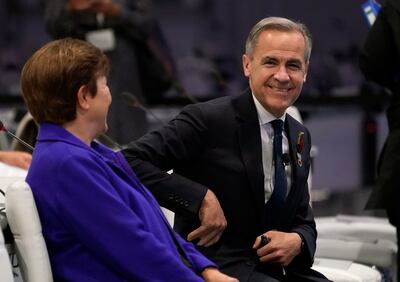Investors opened a $130 trillion war chest to tackle climate change on Tuesday in what Britain's finance chief described as a "historic wall of capital" to lead the global response.
Chancellor of the Exchequer Rishi Sunak told delegates at the Cop26 summit that a coalition of banks, insurers and asset managers would provide the financial firepower to meet the Paris Agreement goals.
He said Britain's wealthy finance industry would become the world's first "net-zero financial centre" under new rules on disclosing green activities, aimed at ensuring that the vast sums hit their intended target.
Mr Sunak used the summit's designated Finance Day to assure developing countries that a delayed $100 billion in annual funding would soon be in their treasuries more than a decade after it was promised.
The money was due to come from a mixture of public and private sources but governments blamed stagnant private investment for the failure to meet the target by 2020.
"While we know we are not yet meeting it soon enough, we will work closely with developing countries to do more and to reach the target sooner," Mr Sunak told delegates in Glasgow.
The private sector commitment comes from an initiative called the Glasgow Financial Alliance for Net Zero, led by Mark Carney, former governor of the Bank of England and now a UN envoy for climate.
It was announced on Wednesday that US billionaire Michael Bloomberg would join Mr Carney as a chairman of the coalition, which said it had brought together 40 per cent of the world's banking asets.
It makes up about 450 companies who represent a combined $130 trillion in assets. They are committing to manage their funds in accordance with climate goals and provide annual updates on their work.
Their funding is intended to help meet the goal of the Paris Agreement to cap global warming at 1.5°C above pre-industrial levels.
But Mr Carney said reforms of the financial system were needed, including mandatory climate disclosure rules, so that the pot of money does not go to waste.
Speaking later, Mr Sunak told Bloomberg TV that financial rules needed to ensure that “what sits there on a piece of paper is actually going to turn into tangible actual projects on the ground”.

Mr Carney said investors had long seen climate action as a form of corporate social responsibility. "Too many thought that this was someone else’s problem," he said in Glasgow.
"Right here, right now is where we draw the line. Right here, right now is where private finance draws the line," he said. "Make no mistake, the money is here, if the world wants to use it."
He said money was being put aside this decade to fund the green transition in emerging and developing economies.
The costs of carbon neutrality, Cop26 organisers say, include $16tn for electric power, $5.2tn for energy-efficient buildings and $1.5 for a green overhaul in agriculture.
Mr Sunak said electricity for schools and hospitals in Africa, flood defences in the Philippines and Pacific islands and better-insulated homes around the world were among the priorities for investment.
Alok Sharma, the president of Cop26, said there was more private and public finance for climate action than ever before.
"I am delighted that work is underway to mobilise finance into developing countries to help with their energy transition," he said. Countries are telling us what they need, now global finance needs to respond."
Campaigners had criticised a lack of focus on fossil fuels in the finance coalition's plans, but welcomed an indication from Mr Carney that banks would be urged to steer money away from oil and gas.
"The net zero alliances must now incorporate robust requirements on 1.5°C-aligned fossil fuel phase outs into their criteria for financial institutions," said analyst Patrick McCully of the group Reclaim Finance.
Janet Yellen, the US Treasury Secretary, said green investments were the "greatest economic opportunity of our time", echoing President Joe Biden's focus on jobs.
"As big as the public sector effort is across all our countries, the $100tn-plus price tag to address climate change globally is far bigger," she said.
"The gap between what governments have and what the world needs is large and the private sector needs to play a bigger role."
Patricia Espinosa, executive secretary of the UN Framework Convention on Climate Change, said the pledges would help “move the billions to the trillions” in global finance.
“There is the money. We need to mobilise it for climate. We need to put it at the service of this,” she said.
The finance negotiations are the first of the specialised days of events at Cop26 after world leaders wrapped up their initial talks on Tuesday. Attention will turn to energy, young people and nature later in the week.
The UK's Treasury said Tuesday's talks were the largest ever meeting of finance leaders on climate change.
Net-zero finance
Mr Sunak said Britain would strive to become a net-zero financial services centre by cutting out investments in carbon-intensive industries.
He told Cop26 delegates he wanted to "rewire the entire global financial system for net zero" by strengthening transparency rules on green investment.
Mr Carney said the goal for Cop26 was to build a financial system in which every decision takes climate change into account.
The UK financial sector's carbon emissions exceeded the net annual output of most countries in 2019 as a result of worldwide investments, a study by environmentalist groups including Greenpeace claimed in May.
Under Mr Sunak's proposals, financial institutions and listed companies that operate primarily in Britain would be required to publish net-zero transition plans.
Mr Sunak is proposing an expert task force to develop a "gold standard" for such decarbonisation plans, to prevent them from misleading customers in what is known as greenwashing.
A fact sheet on Mr Sunak's proposals specified that it would not be mandatory for companies to commit to net zero and they could set different targets.
It also said that investments in carbon-intensive activities would still be allowed.












